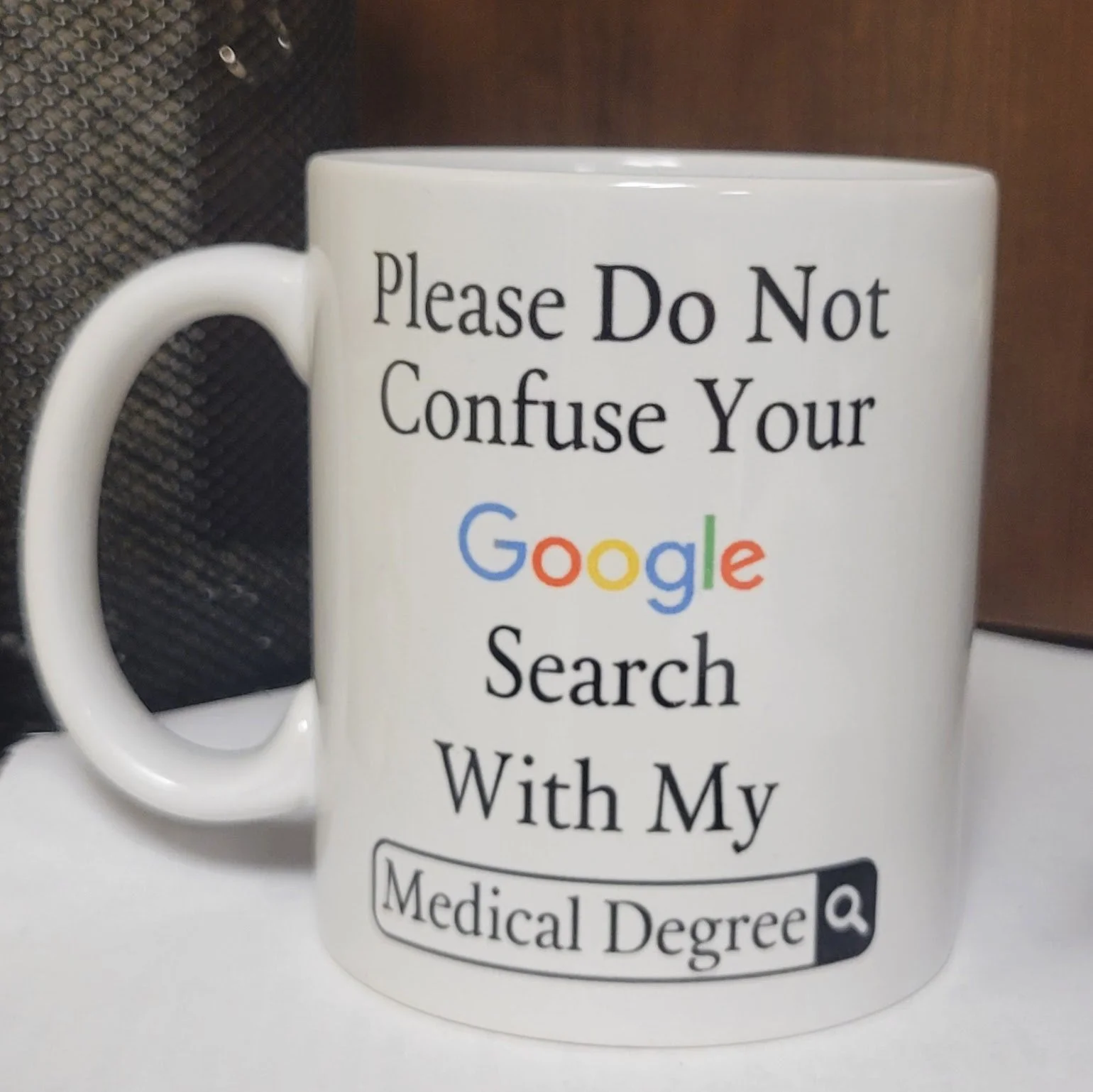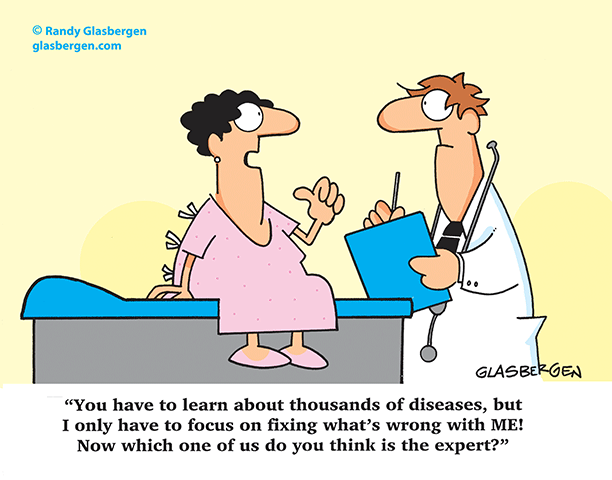“Don’t Confuse Your Google Search with My Medical Degree”
By Ailene Gerhardt, MA, BCPA, CSA®, Founder, Beacon Patient Solutions LLC & Navigating Solo Network
Reflections from a Patient Advocate’s Perspective
October is Health Literacy Month, an international observance dedicated to increasing awareness and improving the ability of individuals to obtain, process, and understand basic health information and services needed to make informed health decisions. Health literacy influences everything from following medication instructions to navigating emergencies. This month also highlights the importance of collaboration among healthcare professionals, advocates, and organizations to ensure health information is clear, accessible, and usable by everyone.
In recognition of Health Literacy Month, a small moment from a recent doctor’s visit stood out to me. On the exam room counter, I spotted a mug that read: “Don’t confuse your Google search with my medical degree.”
It made me laugh because it’s true. Yet behind the humor is a serious and growing reality in healthcare today. More than ever, patients arrive at appointments armed with information, questions, and sometimes anxiety fueled by late-night online searches.
The Promise and Pitfalls of Online Health Information
As a patient advocate, I often see both sides. On one hand, clinicians spend years studying, training, and gaining experience to provide safe, evidence-based care. On the other, patients are becoming more engaged and proactive, wanting to understand their health and make informed choices. The internet, for better and for worse, has changed the way people approach healthcare.
The upside is clear: patients have more access to information than ever before. They can learn the basics of a condition, understand what certain tests mean, and prepare questions before appointments. For many, the internet is the first step in taking ownership of their health.
But the downside is equally real. Not all information online is reliable, accurate, or trustworthy. Symptoms can be misleading, leading patients to fear the worst. A search for a simple headache might lead someone to believe they have a brain tumor. Inaccurate or incomplete information can create unnecessary anxiety.
Turning Research Into Advocacy
So, how do we strike the right balance? The goal is not to discourage patients / clients from researching, but rather to help them use information as a tool for self-advocacy, not self-diagnosis.
Here are three ways to make sure online health research works for you, not against you:
Be Curious, Not Conclusive: Think of your research as preparation, not a diagnosis, prescription, or treatment plan. Use it to form thoughtful questions like, “Could this apply to me?” or “What are other possible explanations?” instead of arriving with a self-diagnosis in hand.
Choose Reliable Sources: Stick to credible sites such as Mayo Clinic, MedlinePlus, Cleveland Clinic, or pages ending in .gov or .edu. Social media posts, blogs, and message boards can offer personal stories but shouldn’t replace verified medical information.
Bring What You Have Learned and Make Sure to Listen: Share your findings respectfully. A simple phrase like, “I read about this online. Can you help me understand if it fits my situation?” invites collaboration, not confrontation.
Remember: You Are the Expert on You
Perhaps the most important piece of the puzzle is remembering this: you are the expert on you. You know your history, your body, your symptoms, and how you respond to treatments better than anyone else. That lived experience is essential to your care.
At the same time, your clinician is an expert in their field of practice. They bring medical training, diagnostic skills, and evidence-based knowledge. When both perspectives are valued: the clinician’s medical expertise and your personal expertise, healthcare becomes a true partnership.
Being a self-advocate means showing up prepared, informed, and engaged. It also means being willing to listen and learn. It means accurately keeping track of your health information, asking questions when things aren’t clear, and not being afraid to speak up when something doesn’t feel right. Advocacy IS NOT about challenging your provider at every step. It’s about ensuring your perspective is part of the conversation and your care reflects both medical guidance and your personal values.
Building a Culture of Shared Decision-Making
Health literacy and self-advocacy are not just individual responsibilities. They are part of building a healthcare culture where patients and providers work together. Shared decision-making is one of the most powerful tools in modern healthcare. It acknowledges that while clinicians are experts in medicine, patients are experts in their own lives.
When patients have access to clear, reliable, and understandable information, they can weigh the risks and benefits of treatment options in the context of what matters most to them. That kind of collaboration leads to better outcomes, stronger trust, and care that feels personalized and respectful.
A Mug With a Bigger Message
That mug reminded me that while a Google search can’t replace a medical degree, it can support a meaningful conversation between you and your provider. The internet should be a bridge to understanding, not a barrier.
As we recognize Health Literacy Month, let’s remember that informed patients and skilled providers are not adversaries — they’re allies. When curiosity meets expertise, and when advocacy meets listening, healthcare becomes what it should be: a collaboration centered on you.
And sometimes, it all starts with a simple question or a smile at a mug that speaks a bigger truth.
Connect With Us: When the complexity of your healthcare situation is too challenging to navigate on your own working with an independent board certified patient advocate can help cut through the “red tape” and reduce complications at an emotional time. Contact Ailene to learn more about the value of working with a private healthcare advocate.



